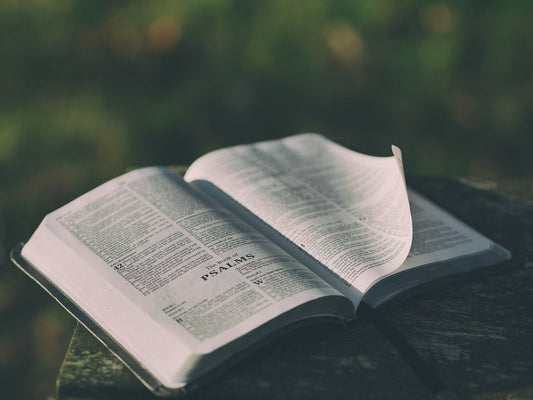
Do you ever feel like it’s all up to you? By Emilee Kurt
Do you ever feel like it’s all up to you? That your income, the discipleship of your children, your health, or the dynamics of your church falls on your shoulders? Many of us would not claim that it’s all up to us. “God is in control, of course. I’m just being obedient.” But often, our actions display a lack of trust in His control. We get sidetracked by the constant noise to become a boss babe, and suddenly feel guilty for needing a nap, a nutritious meal, or an entire 24-hour period away from our screens.
It’s in these seasons of overworking that we often feel like an escape is just what we need. If I had a week off in a beautiful place, everything would fall back into place. Though I love travel and there is nothing inherently bad within it, I have found something else to be true when I’m away from my laptop and all my normal responsibilities. I often think that an escape will give me the silence I crave, but instead, my mind felt louder because I finally had the chance to hear myself think.
Henri Nouwen dedicated seven months to living among monks and published his journal from that time in 1976: “The Genesee Diary: Report from a Trappist Monastery.” He wrote about how the noise of inner life became overwhelming against the externally peaceful and mundane setting of the monastery. For him, it led to more doubt than what had drawn him to the monastery in the first place. He wrote, “I suddenly saw much better than before that one of the greatest temptations of a monk is to doubt God’s love. Those who enter a contemplative monastery with the intention of staying there for life must be very much aware of their own brokenness and need for redemption. If the monastic life should lead them away from God for whom they came to the monastery. Therefore, the growing realization of one’s sins and weaknesses must open the contemplative to a growing awareness of God’s love and care…. This is the great adventure of the monk: to really believe that God loves you, to really give yourself to God in trust, even while you are aware of your sinfulness, weaknesses, and miseries.” (Emphasis mine.)
While I am not a monk, on my last retreat to be refreshed physically and spiritually I experienced the same inner turmoil. I sat on the porch swing facing a line of trees in the Smokey Mountains. I balanced the coffee cup on my knee, and read the Psalm over and over again.
“He gives His beloved sleep.”
Even though I was on a work trip, being away from my office and laundry room helped me see just how frantic my mind truly was. When all the normal noise stopped, what arose in me took me by surprise. I was hurt and offended quickly, and I found myself hanging up on my husband when a simple expectation had not been met. I was holding people at arm’s length until thankfully time and kind hearts led to a healing cry and connection.
I had been holding in all my inner turmoil in the name of productivity, and here in this beautiful cabin in the mountains, I didn’t feel immediate relief.
I felt the sin, weaknesses, and miseries that Nouwen wrote about.
I turned Chris Renzema on, opened a blank document, and started typing everything that was making me uneasy. As I sorted through everything that felt so uncomfortable in the moment, I realized that everything that was bubbling up in me was so small, but I hadn’t sat down to sort my thoughts out with a single journal entry in weeks or months.
My days had looked like some version of this: wake up, scroll Instagram, get dressed, sit down at my laptop to work, work until dark, eat something, and either (1) spend time with family or (2) work on another project at my laptop. I was neglecting the needs of my body and soul. I was spinning out to make others happy, but at the same time spread so thin that I wasn’t showing up wholeheartedly in any one place.
There is the call to everyday faithfulness and stewardship. And then there is overworking. We must remind ourselves of the difference! The root of overworking can come from several places whether it is wanting to please people, avoiding hard emotions, the love of money or fame, or a mix of it all.
Psalm 127 says in verse 2: “It is in vain that you rise up early and go late to rest, eating the bread of anxious toil; for he gives to his beloved sleep.”
By contrast, Proverbs 31 says this about a godly woman as it pertains to her productivity and service: “Her lamp does not go out at night.”
Naturally, we are led to ask: what is the difference? When it is right to toil late into the night and when is it striving?
Colossians 3:23-24 says this: “Whatever you do, work heartily, as for the Lord and not for men, knowing that from the Lord you will receive the inheritance as your reward. You are serving the Lord Christ.”
Are we serving with our whole hearts and an alert mind?
Are we desperate for affirmation, more money, and to be noticed?
Are we making time for a life-giving Sabbath and rest in the evenings, or are we numbing out with a screen at the first sign of margin?
Do we need our work for our sense of identity, or are we working to receive our identity?
As I sat in Psalm 127 for several days at this retreat I was exceedingly comforted by the image that sleep was not this selfish desire. Sleep, rest, and enjoyment in the fruit of my labor is a gift from God himself! I am called to work with my whole heart to what God has put before me this day. But the difference is - with work and sleep alike - can be done with a heart of trust in God, that you would be serving if it was only for him, and resting knowing that he holds you and everyone that you’re worried about.
Friend, you are his beloved! This means that you don’t have to choose between wholehearted work or restful sleep, by his grace. Work unto the Lord, trusting that he will multiply your efforts even when he is the only one who sees. Know that you are held in his care, and he invites you to rest in his peace.
God created you with limitations in mind. Instead of resisting every limitation with white knuckles, may we receive the current circumstances of our season with joy claiming that “the boundary lines have fallen for me in pleasant places” (Psalm 16:6).
“In peace, I will both lie down and sleep;
For you alone, O LORD, make me dwell in safety.” — Psalm 4:8




